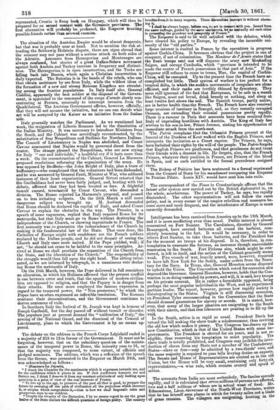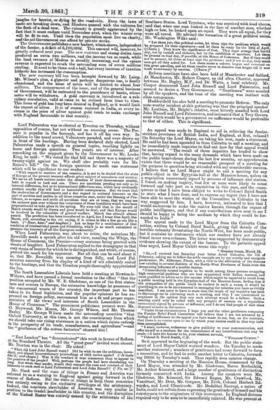• The accounts from India are most melancholy. The famine
spreads rapidly, and it is calculated that seven millions of persons are affected, two and a half millions or whom are in actual want of food. Mr. Edmonstone, Lieut.-Governor of the North-West Provinces, writes that he has himself seen places in which for twenty miles not a blade of grass remains. The villagers are emigrating, hunting in the
jungles for berries, or dying by the road-side. Eveu the laws of caste are breaking down, and Hiudoos quarrel with the vultures for the flesh of a dead cow. 'The calamity is greatly aggravated by the fact that it. must endure until November next, wheu the winter crop will be fit to cut. Until then the population must live on charity, and the aid Government can afford by private works. The Government publishes a new budget, which shows, independent of the famine, a deicit of 6,700.0004 This iimount will, however, be greatly reduced next year. The new customs and stamp duties have produced an extra two millions, and the income tax as much, while the land revenue of Madras is steadily increasing, and the opium revenue is expected to reach the astounding awn of seven millions sterling. It used to he three and a half, but every increase of taxation hitherto has increased the consumptiou.
The new currency bill has been, brought forward by Mr. Laing. Mr. Wilson's plan, a gigantic and perhaps dangerous 011f, is finally abandoned, and the issue of notes will be limited to about four millions. The management of the issue, and of the general bosiness of Government, will be entiusted to the presidency of banks, whose notes will be withdrawn. A gold currency is introduced as a sub- sidiary circulation, valid at rates to be revised from time to time. 'This issue of gold has long been desired in England, as it would limit the export of silver. It is of course resisted in India, as every in- crease in the price of silver against gold tends to make exchange with England favourable to that country.































 Previous page
Previous page